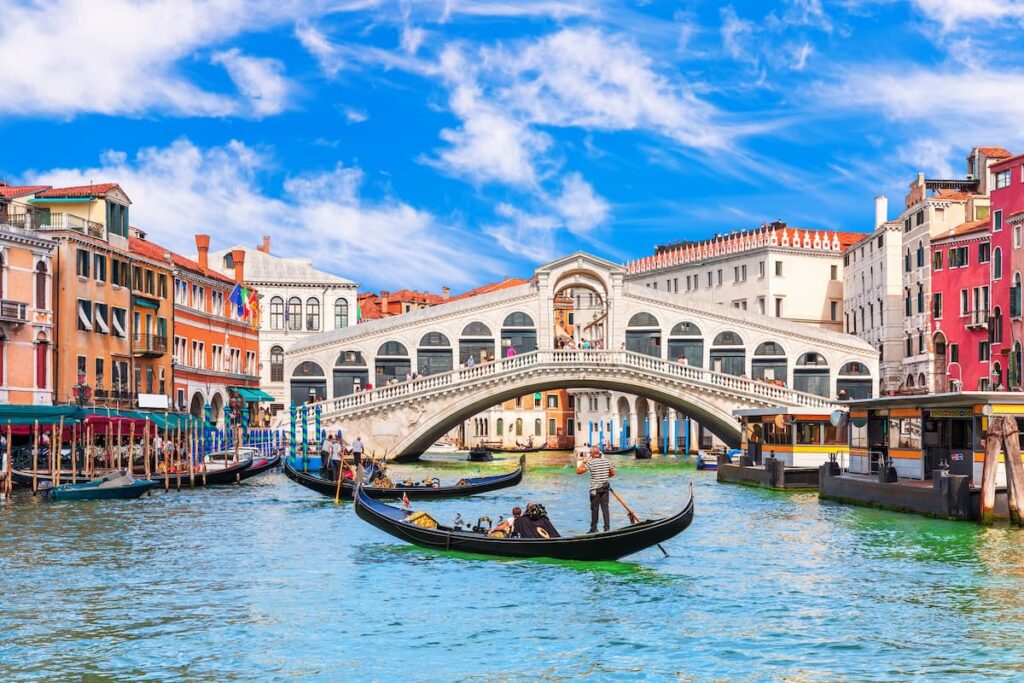Local Youth Vow to Block Canals as Opposition Gains Momentum
Venice is facing a wave of unrest ahead of the highly anticipated wedding of billionaire Jeff Bezos and journalist Lauren Sánchez, scheduled for June 28. What was meant to be a glamorous celebration in one of the world’s most iconic cities is now becoming a flashpoint for a broader protest movement. Hundreds of young Venetians, identifying as underemployed or “precarious,” gathered near the Rialto Bridge to voice their outrage, accusing the event of symbolizing inequality, gentrification, and the erosion of the city’s soul.
At the heart of the protest is a message of resistance: “No Space for Bezos.” Banners bearing that slogan—alongside drawings of Bezos’ Blue Origin rocket—have appeared in key landmarks, including the bell tower of San Giorgio Maggiore. Protesters have promised to physically block access to rumored wedding venues like the Misericordia, an exclusive 14th-century site in central Venice. Organizers say they are ready to line the streets and canals with bodies, dinghies, and inflatables to disrupt the ceremony.
A City Under Pressure From Overtourism and Inequality
The backlash against Bezos’ wedding highlights the mounting tension in Venice over overtourism and its impact on daily life. The city has already implemented a €10 entry fee for day-trippers during weekends and peak periods. But many residents argue that such measures are insufficient, as essential services like schools, hospitals, and affordable housing continue to disappear.
Critics also point to the temporary nature of the employment generated by major events. While weddings of this scale may create jobs in hospitality and logistics, the lack of stable, long-term opportunities remains a point of frustration. Organizers like Federica Toninello and Na Haby Stella Faye argue that Venice should not become a playground for the global elite at the expense of its own people. “Let’s make sure Venice is remembered not for hosting Bezos’ wedding,” Faye told the crowd, “but for rejecting it.”
Past Protests Have Shaped the City’s Future
Venetian protests have a history of success. The “No Grandi Navi” movement, which opposed large cruise ships docking near the city center, eventually led to a ban that forced cruise lines to reroute to ports like Ravenna and Trieste. Similarly, regulations around short-term rentals emerged after sustained campaigns against platforms like Airbnb, which were blamed for driving up housing prices.
The opposition to Bezos’ wedding, however, taps into a different kind of symbolism. While lavish weddings are not new to Venice—George and Amal Clooney’s 2014 nuptials drew wide praise—this time, the mood is different. Protesters view the Bezos celebration as emblematic of a growing disconnect between the city’s image and its reality.
Still, not all Venetians agree. Regional governor Luca Zaia condemned the protests, calling them “a disgrace.” Venice mayor Luigi Brugnaro went further, saying he was “ashamed” and urged Bezos to proceed with the ceremony, insisting the demonstrators do not represent the whole city.
Debate Reflects Venice’s Identity Crisis
Outside the protest zones, some residents and visitors see the event in a more pragmatic light. At the Architecture Biennale, Berlin visitor Görge Meyer noted that such weddings bring a financial boon. “This will employ hundreds of locals, from water taxi drivers to restaurant staff,” he said. “Why reject that?”
Longtime resident and travel planner Gillian Longworth McGuire echoed the sentiment but pointed to a deeper conflict: “Venice doesn’t seem to know what it wants to be. Is it a romantic relic of the past or a commercial events hub? It was always a crossroads of the world. That hasn’t changed.”
As the date draws near, what should have been a private celebration now stands as a public referendum on Venice’s future. Whether the canals are blocked or the wedding proceeds without disruption, the protest has already stirred a debate the city can no longer avoid.


